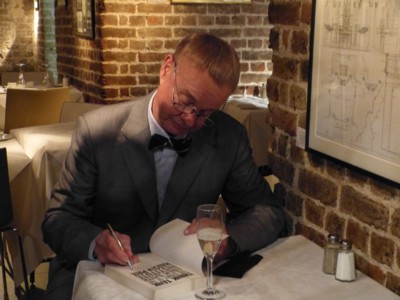Madsen Pirie’s new book, Think Tank: The Story of the Adam Smith Institute was launched earlier this evening in the crypt of St John’s, Smith Square. Here is what it says in the book’s first chapter, entitled “Shaping an institute” (pp. 3-4):
There was an institute in London which drew heavily on Smith’s ideas, and those of the free-market economists who had followed in his wake. This was the Institute of Economic Affairs (lEA), founded by Sir Antony Fisher twenty years earlier, and which had published a steady stream of monographs analyzing the deficiencies of central direction, state planning and economic intervention. They were intellectually rigorous, and had made their way into the literature of economics libraries, albeit in a separate corner, almost fenced off from the mainstream.
But we wanted something more. It was all very well to win theoretical arguments, but nothing seemed to happen afterwards. Governments continued on their unruly ways, while academics devised new follies to set up on the wreckage of the old ones. We wanted to change reality; to have an impact on what actually happened. We wanted to make policy.
Adam Smith might have been one strong influence on our thinking, but there were others. One was James Buchanan, the Nobel Laureate who, with Gordon Tullock, James Niskanen and others, developed what came to be known as Public Choice Theory. In essence ‘it took the ideas of economics into the domain of politics and administration. Instead of ‘treating politicians and civil servants as selfless seekers after public good, the theory treated them as if they were ordinary economic participants, out to maximize their own advantage, just like other people. it proved a very fertile theory tor explaining what would otherwise have been incomprehensible outcomes. It also fitted in with the rather less than respectful way that we ourselves regarded politicians.
Public Choice told us how minority interest groups could hijack the political agenda to have advantages created for themselves. It explained how politicians respond to pressure from vociferous and self-interested groups, but not from a public at large which might be largely unconscious of the effect policy made upon it. Public Choice Theory was basically a critique, but we began to wonder if there could be a creative counterpart to it. Just as Public Choice Theory told us why certain policies were doomed to political failure, however economically sound they might be, could it not be used to create policies that would not be subject to these limitations? Could new free-market strategies be crafted that flowed with political reality by building in the support of the interest groups which might otherwise derail them?
This was powerful stuff. …
Indeed it was. As soon as I’ve read the rest of this book, I’ll tell you what I think of it.
Meanwhile, here is a picture I took at the launch, of the author hard at work signing copies.
Not surprisingly, the ASI blog already has a posting up on the subject.




